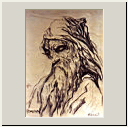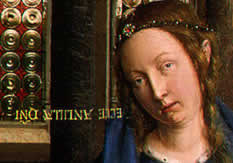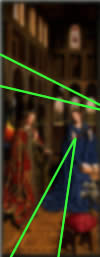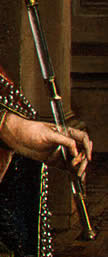| Nenad Jankovic, a Croatian artist, portrays scenes from Scripture in his charcoal drawings.
Here's his Isaiah. |  |
Arts & Culture: March 2004 Archives
Some more details about the Annunciation painting posted last week, which was painted by Jan van Eyck around 1434-36.
 |
||
ECCE ANCILLA D[OMI]NI |
||
|
|
SCENES OF HEROISM The floor has illustrations of one man doing great things (in this case, Sampson destroying the enemies of God) |
|
 |
COMPLEX COMPOSITION The composition uses two perspectives: the foreground objects have a vanishing point somewhere in Mary's abdomen, thus focusing attention on where Jesus is conceived. The other lines have their vanishing point just past the righthand side of the painting. |
|
|
|
THE TRINITY God the Father appears in the stained-glass window at the top, God the Son is in Mary's womb, and God the Holy Spirit is the dove descending on the golden sunbeams. |
|
 |
INTRICATE DETAILS At left, see how the crystal of Gabriel's scepter is translucent, allowing part of his hand and the pillar in the back to be visible. Also, note the light refracted through the circular glass in the topmost picture. |
|
THE MOST ASTONISHING DETAIL The painting is only a little over a foot wide and slightly less than three feet tall. It was the left panel of a triptych, a three-part painting that usually had one central painting in the middle, with two painted panels on the sides that closed to conceal all of the paintings. Typically, a sacred triptych would have been closed except during Mass, at which time it would have been opened while the priest was at the altar. The congregation would have been too far away to see any fine details (though they would have been able to see that it was the Annunciation), and the priest would have been busy praying. This meticulous work -- hours of sketching, layering expensive pigmented oil paints, getting the simulated lighting and skin tones just right -- would have scarcely been seen by anyone except God Almighty. More information about the painting is at the National Gallery of Art. |
||
Marvin Olasky's Christian newsmagazine WORLD has a cover story on art and culture, and makes an interesting point about art as a divine vocation:
"Bezalel and Oholiab and every craftsman in whom the Lord has put skill and intelligence to know how to do any work in the construction of the sanctuary shall work in accordance with all that the Lord has commanded." And Moses called Bezalel and Oholiab and every craftsman in whose mind the Lord had put skill, everyone whose heart stirred him up to come to do the work (Exodus 35:30-36:2).This is the first text of Scripture that directly teaches the doctrine of vocation: Bezalel has been "called by name." Bezalel, also the first to be described as having been filled with the Holy Spirit, is given a task by God, who has called him not into some prophetic office, but to work with his hands, to serve God and his neighbors by being an artist.
I wrote this essay about Martha Stewart four years ago in a writing class. I had intended to shop it around for publication somewhere, but my daughter was born a month later and I never got around to it. Not knowing much about Ms. Stewart and her empire, but seeing that she made a lot of people angry, I wanted to know more about her. An excerpt:
Feminists probably think of Martha Stewart the way capitalists think of pawnshops – the seedy side of their ideology, unsightly yet unavoidable. She may be a success on her own terms, but that success is compromised by her subject matter. It’s all right to be a rich corporate lawyer, but to become wealthy by telling people how to give parties, well, that’s so very…domestic.
As Joe Sobran and various others have pointed out, one complaint about the Passion movie is to call it "pornographic" because of its violence.
But apparently you can leave out the qualifier! The admirable Jesuit professor Fr. Ronald Tacelli gave a talk at my parish on Sunday, and mentioned the latest theory he's heard from the cultured despisers of religion. Some people are saying that Passion is just plain porn: or gay porn, to be specific. Now that's pretty ridiculous, Professor Tacelli says: if Mel Gibson were to turn the Crucifixion of our Lord into gay erotica, the liberals would be praising it! They'd say it's "transgressive"!
For several years, I've been bouncing around the idea of helping start a plainchant choir at my parish. Mainly, the idea has been bouncing around in my head, because my desire exceeds the amount of free time I can spare, as well as my expertise (which is pretty much limited to loving chant and having many CDs of early church music).
Then one of the organists at our parish said he would be willing to help coordinate a plainchant group and help with the music. He also knows of one other bass who could sing. This may come to nothing, but if the time commitment isn't too great, I'm very excited to do it.
Anyone have any advice? How to pick music, how many voices to recruit? Your thoughts will be poured into the empty vessel that is my mind.
More comments on a movie I haven't seen:
Charles Krauthammer's column today about "The Passion" is most unfortunate, mostly because he's wrong, but also because his analysis is one of the most penetrating.
So it is with sadness that I read him saying that "...Mel Gibson's 'The Passion of the Christ' such a singular act of interreligious aggression. He openly rejects the Vatican II teaching and, using every possible technique of cinematic exaggeration, gives us the pre-Vatican II story of the villainous Jews." Further, "these deviations [from the written Gospels] point overwhelmingly in a single direction -- to the villainy and culpability of the Jews."
Usually, Krauthammer's Friday column is worth reading because his analyses are better-written and original than most writers. This column is a tired rehash of points that have been made a thousand times elsewhere, and the writing itself is perfunctory. Saying that Jews "come off rather badly" is completely disingenuous -- does Jesus come off badly? How about his mother? Mary Magdalene? Simon of Cyrene? From what I've heard, they're all portrayed sympathetically, and from what I've read, they were all...Jews!
What people are really objecting to is not "The Passion" but the Christian understanding of the Crucifixion -- that it was an internal Jewish dispute that the Romans were dragged into. Preferring to keep the peace rather than do justice, the local imperial representative ordered Jesus of Nazareth to death.
The only way to call that an anti-Jewish interpretation is if you say that Christ and the members of his movement were not "really" Jews. Perversely, that's what anti-Semites have done throughout history, and that warped tradition continues to this day. Is he saying that some portion of the Judean population could not have possibly urged the death of Jesus Christ? Or that a Jewish mob, constituting a small percentage of the population, might have urged his death -- but we should never mention that fact, even if it is coupled with the teaching that whatever group was the proximate cause of Jesus' death, we are all ultimately responsible for crucifying Christ because of his sins?
It's extremely disappointing to see Charles Krauthammer lend his considerable prestige to a false and insulting charge against believing Christians.
British video artist Leo Earle has a clever two-minute Quicktime film about finding God in the midst of doing the dishes.


